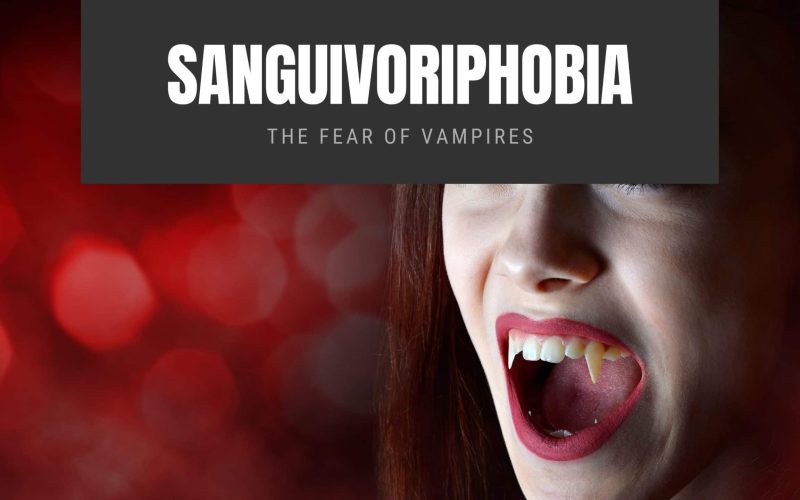Every human who sees horror movies knows that vampires are a thing. At least Hollywood has made us believe that vampires are lurking around in the dark and will take every available chance to suck our blood by sinking their teeth into our necks.
Well, that’s enough reason to be scared and maybe even enough to cause a full-blown phobia in some people.
Sanguivoriphobia, in a literal sense, means “fear of blood eaters” and because vampires are known as “blood eaters”; thus, the definition – Sanguivoriphobia is the unwarranted and intense fear of vampires.
Sanguivoriphobics are of the strong belief that vampires exist, and with the way popular culture paints vampires, they also believe that vampires can harm them.
Causes of Sanguivoriphobia
Although it is not sure what the exact cause of Sanguivoriphobia is, some factors are believed to cause this psychological condition.
Experts have summed them up in “Genetic and Environmental” factors. Genetic factors make phobias and other medical conditions inheritable, just as physical traits are.
Thus, experts suggest that ancestors with Sanguivoriphobia can pass it down to their descendants.
While under environmental factors, traumatic events can increase an individual’s risk of developing a specific phobia.
For example, an unforgettable scare from a vampire costume wearing an individual or a gruesome horror film about vampires can make the person develop Sanguivoriphobia.
Still under environmental factors, having a family member with Sanguivoriphobia leaves children at a higher risk of developing this mental condition.
Symptoms of Sanguivoriphobia
Symptoms are signs indicating the presence of a medical condition or an anomaly. The psychological symptoms of sanguivoriphobia include dread, terror, and panic.
Thinking, discussing, seeing, or reading anything that relates to vampires can trigger the person to have the above-mentioned psychological symptoms, which may result in the following physical signs:
- Heart rate palpitations
- Difficulty in breathing
- Inability to make complete sense when speaking
- Dry mouth
- Stomach upset
- Nausea
- High blood pressure
- Trembling
- Sharp chest pain
- Choking sensation
- Dizziness
- Excess sweating
- A sense of lurking doom
Treatment of Sanguivoriphobia
The treatment of Sanguivoriphobia is crucial and should be applied based on professional help for the best results.
These treatments are available, but their effectiveness depends on the sufferer’s level of fear.
They include:
- Psychotherapy
- Medications
Psychotherapy
This is the use of psychological methods by mental health experts to help their clients obtain desired results. This is used in the efficient treatment of phobias, particularly Sanguivoriphobia.
Cognitive-behavioral therapy
CBT is frequently used in these techniques. This form of treatment aims to help you identify negative thoughts, beliefs, and behavioral patterns and then turn them into positive ones.
Those extremely negative impressions you have towards vampires are piped down to make you feel safe, and the belief you have about vampires existing is changed to making you believe that they are just mythical creatures that cannot harm you because they do not exist.
Exposure Therapy
This therapy involves gradually exposing the patient to their source of fear in a controlled environment under professional superintendence.
This works by desensitizing the person so that they feel anxious at each exposure. This is an effective form of treatment; however, it is not safe, as the risks of making the condition worse are possible; therefore, this should be done by an expert.
Small talk about vampires and your fear of vampires may be used to kick off this technique before graduating to audio records, images, and sculptures of vampires in a controlled professional setting. You will feel less scared at each encounter.
Hypnotherapy
This is a form of therapy where your therapist opens your subconscious mind to reprogram those negative thoughts, beliefs, and behavioral patterns into positive ones, convincing you that there is no need to be afraid.
This will assure your subconscious mind that you don’t need to fear vampires.
Medication
antidepressant drugs and anti-anxiety medicines can be prescribed to help calm your nerves down whenever your body is triggered into anxiety and panic attacks.
This, however, is not the cure to any phobia, particularly Sanguivoriphobia, but it helps give the patient some temporary relief and helps them bring their emotions under control.
In treating phobias, particularly Sanguivoriphobia, you may require either or both therapy and medications.
Conclusion
Having this phobia may be challenging and unpleasant, but by following your treatment plan religiously, you can learn to keep your fears and yourself under control.
At the same time, you subsequently recover to continue living your life to the fullest.
If you find this an interesting read, kindly check out other phobia articles on our site and leave a comment below.








